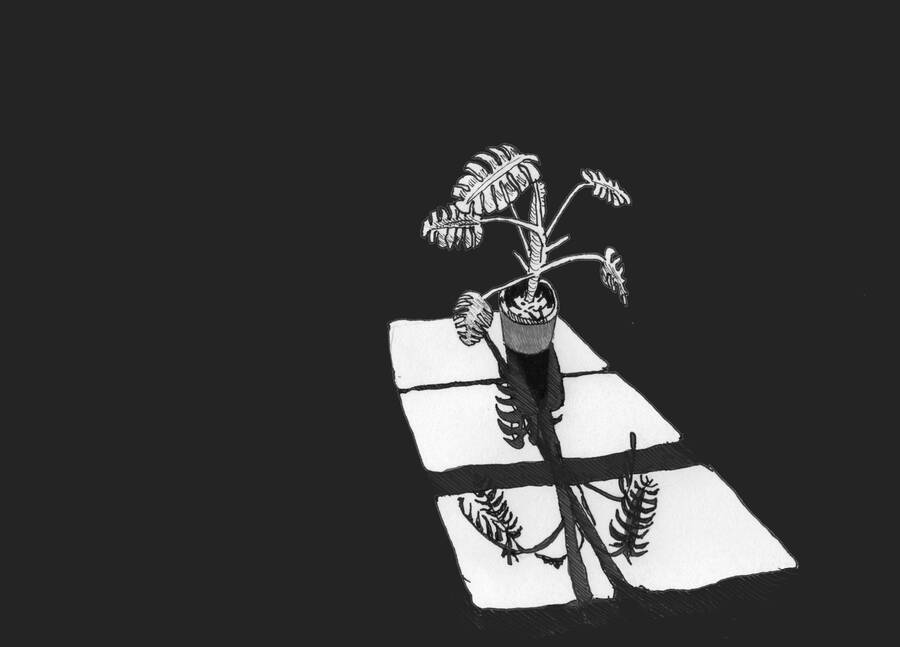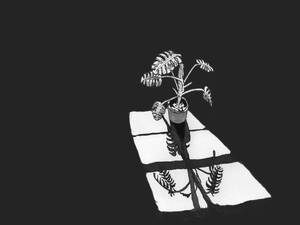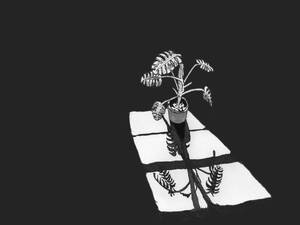Provisions #8: “If I could just leave the old things to their trembling”
Meditations in a crisis on poems by Canisia Lubrin, Wisława Szymborska, and Kenyan Freedom Fighters.

In “Provisions,” three poetry readers reflect on a poem they’ve been holding close during this difficult time.
A FRIEND ASKS, “How are you?”
I say, “I don’t know.” I say that I am trying to make sense of, that I am trying to figure out, what new words/worlds are being put in place. Even as I must focus on particular events—police murders, monuments to white supremacy finally coming down, ongoing mass protest, death from the virus, the threat of mass evictions—I am also trying to pull back that focus so I might try to understand, more broadly, what is being contested fiercely and what is being imagined differently.
I find myself struggling to concentrate, struggling to find words to speak and to write. So much is in the air, so much is at stake. I tell my friend that this shifting focus has left me feeling fuzzy around the edges, indefinite and suspended. I feel light and insubstantial, heavy, grief-filled and hopeful—though that hope is provisional and waning, while the grief seems, somehow, definite and ongoing.
My friend tells me that the first cluster of adjectives (fuzzy, indefinite, suspended) makes them think of clouds and of my frequent photos of clouds. I started taking those photos to remind myself to breathe, and to look up and out. The clouds make them think of what, but also how, clouds hold and release.
Hold and Release; word-world.
This is a strange and difficult time, one that feels, to me, like multiple times being lived at once. I’ve lived part of these past several months alongside a part of the past, which means that places, objects, people have been insistently returning to me, sometimes in dreams—waking and sleeping—and only rarely in nightmares.
Some of what returns are things I thought I would never forget. But now, as they replay in my dreams, I recognize that I’d forgotten what I, at some earlier time, had thought would always be right there, on the surface of things, on the skin, touchable and tender. Dream and return.
In the midst of all of this feeling, I’ve been sitting with Canisia Lubrin’s shattering poem The Dyzgraphxst. Lubrin works with and at what survives TransAtlantic slavery, that disaster of modernity, its ongoing effects. She writes the poem, she specifies in the book’s dedication, “for the impossible citizens of the ill world.” Living in this ill world, this impossible citizen is holding her book close.
In the book’s title, the I of The Dyzgraphxst is replaced by the superscripted x. In the poem, when that I appears, it signifies a self that is diffuse and choral, singular and collective. This I refuses the ways Black people are written by those who make and profit from the ill world. This I collects and gathers; it is lifted with all that “lift” carries with it—distance and movement and theft and light and possibility.
I keep returning to “Dream #5” in “Act III, Ain’t I Épistémè? … elsewhere called the transaction of dream and return,” which opens:
If I could just leave the old things to their trembling
If I could leave you to your monuments, too. No innocence
I’ve known the sharp world and it is imagined and gerund
big enough for all of us . . .
[You can hear Lubrin read “Dream #5” here, beginning at 8:38.]
I return to those “Ifs”—those conditional conjunctions—to what they might hold and release, and to the hard knowing beside them: “No innocence” for those who make and for those who meet the “sharp world.” In Lubrin’s hands, this knowing is twofold: The sharp world is material and imagined, and there are multiple ways to see it and to be in it. The perspective of the poem’s subject is multiple; it is the I that knows itself to be “more than one way to see / the word-world.”
“Dream #5” opens me to the force of our collective imagining (“gerund”), as the material and metaphorical monuments to white supremacy are falling. Still, there’s a difference between a word and a world: A word might hold you close when the world does not, gerund; it might measure the distance between what is and what might be. Open to this old/new word/world that was always there and that was “big enough for all of us.”
In the midst of all of the sacrifices (and the sacrificed)—and all that is being made and unmade by masses of young, queer, trans, disabled Black people organizing and gathering in order to insist a habitable wor(l)d into being—I come back to “Dream #5.” And by the time I land in its final line, “How rude of me to force you on the thing that springs blood,” some suspension breaks, some clarity returns. I have been gathered.
My breath has been taken away and then given back.
—Christina Sharpe
With thanks to Keguro Macharia.
LIKE LITERALLY EVERY OTHER GOOD THING, Wisława Szymborska’s “Vietnam” was brought into my life by someone I love. My sweetheart of nine years is a poet, too, and so it’s not uncommon for one of us to break the silence of our shared work studio by suddenly reciting some poem out loud. Such was the nature of my introduction to Szymborska’s nine-line stunner. One day, in the studio, I was preparing to teach a workshop. Earlier in the week, I had mentioned that I was seeking bangers to bring into the space for discussion. Shira, a longtime Szymborska stan, laughed one good, loud, clipped laugh and asked, Have you ever heard this? The next thing I knew she was letting those first flammable bars hit the air.
The gift of single poems carries a particular urgency—charged as they are with the resplendent testimonial of the giver. Even before Instagram made the sharing of screenshots of poems common, teachers, mentors, and friends would slide “loosies” from hand to hand. Yo, you need this shit ASAP. And I did. Every time. When I think of sustenance, the smallest possible building block of nourishment, or what carves a space of reprieve in our most grueling hours, I think of the single poem, its undeniable portability and nourishment. The treasure of the to-go bag. The scrap in the back pocket. The photo in the bra below the titty. The little spell you keep just in case things go left. There is always something fashioned by someone else that will prepare you. Even now, at the intersection of quarantine and uprisings—this horrifying and electric moment, marked by the impossibility of predicting what the next moment might bring. Being isolated and afraid to touch, knowing the police responsible for state-sanctioned murder roam free and virtually consequence-less would be enough. But for me the weight compounds as it comes after a year of gaping, irrevocable, personal loss.
If the past year has taught me anything it’s this: I truly don’t know the limits of my capacity to experience ache. Ya Allah, the sheer vast, endless dimensions of grief! Much more vivid, bald, terrible, and singular than I imagined. But rather than become submerged in isolated despair, I find accompaniment and instruction in precise and rhetorical poems, like Szymborska’s, composed in plain, lean diction and jarring interrogatives. In the staggering translation by Stanislaw Barnczak and Clare Cavanagh:;
“Woman, what’s your name?” “I don’t know.”
“Where were you born, where do you come from?” “I don’t know.”
“Why did you dig a hole in the ground?” “I don’t know.”
It is a poem that resists conclusions and easy sanctuary. The interrogative gesture, repeated, integrates cliff after cliff. Life is that: a sequence of fallings into uncertainty after uncertainty.
“How long have you been hiding here?” “I don’t know.”
“Don’t you know we will do you no harm?” “I don’t know.”
The poem is steeped in the cresting trauma of a moment. As a reader, I want to know what is right and what is wrong, who is bad and who is good, so I can situate myself in the comfort of knowing while I ride out the rest of the text. I want to use my brain to guide me through the poem, but a poem like “Vietnam,” with its disturbing, disruptive flexibility and jaggedness, refuses to let me think myself out of feeling. The reader must relent to discomfort and doubt. The reader finally joins the woman in that traumatic and tenuous suspension, where the brain cannot survive but the heart must. A blunted and non-cerebral place where the questions are pulled taut by non-answers.
But here’s what makes me shake my head: Through the woman’s insistence of using “I don’t know” as a shield, she makes way for what is the most empirically important.
“Does your village still exist?” “I don’t know.”
“Are these your children?” “Yes.”
Claiming the children, without which survival doesn’t matter, is the poem’s final straw, its grand act of clarity. What happens to the self as it negotiates against what terrorizes? What emerges as lone truth and refuge? I am in awe of the gut—ancestor, smartest cell, guardian angel, intuition. Whatever you wanna call it, it finds you. I, too, want my children to live. I’m at the grocery store, dodging strangers. I’m taking out the garbage and holding my breath when someone sneezes. I’m watching a man’s last words with the rest of the world on a loop. I’m panicking in my building’s vestibule. I crave nothing but my head on my sweetheart’s lap and a safety ensconcing us both. But I have only the thin bray of my sanity and the reverberations of a poem’s lesson. It’s not a lesson of knowledge, but a lesson of love. Give me an unassailable day. And then, dawn: I am certain of only this. As merciful a prayer as anything else: I don’t know. I don’t know. I don’t know. Yes—
—Angel Nafis
FOR THE LAST EIGHT YEARS, I have been writing a book about mourning and colonial history. It’s become something of an obsession. The dimensions of the imperial ledgerbook are infinite and so trying to read along its length sometimes has the feel of cloistering myself and reading in a strange monastery. Reading along the asymptote of an evil infinity, reading what otherwise might be forgotten. The amnesia of empire is not a lapse—it is an ideological project inherent in most types of nation-building. What cannot be forgotten are those more material aftereffects of colonialism, the power dynamics that sustain themselves in the present. Postcolonialism is an impossible term: As long as we live in the present of racial capitalism, the dirge of colonialism will always play counterpoint against the musical score of the present. And so my reading often possesses an unintentionally contemporary resonance, as if I am receiving prophecies transmitted from the past. I read the history necromantic—and the once living people of history begin to creep out, their ghosts flickering into sight when I skim the latest news alert on my phone.
Much of this research has little to do with poetry, which is the ostensible purpose of this column. American poets often see their medium as the child of technique and charismatic autobiography, both of which leave out that living world beyond the claustrophobia of style or memoir. While literary critics tend to rely on formal definitions of poetic writings, let us instead ask what we want a given literary tool to do. A few years ago, I visited the National Archive in Kew Gardens, England, and pulled up recently declassified files from the small dirty wars that the British fought against insurgencies around the world. What might a poem do in these contexts? I read one document from the colonial office in Kenya. The file discussed a practice adopted by the Kenyan freedom fighters, the secret ceremonies where they would declare oaths to overthrow British rule. The bureaucrat described these as psychopathic gatherings for insane Satanists. So much more convenient for the British to see the Kenyans as primitives, fearful of modernity, scrambling for refuge in violence and ritual atavism—than simply as people who quite sensibly opposed the endless concentration camps that their colonizers had erected across their country.
What are the oaths like when read from that point of view? A Kenyan Marxist historian named Maina wa Kinyatti edited an anthology of them, many of which he describes as “mobilization songs.” Often these poems rallied the collective memory of the havoc the British had wreaked, the martyrs who had died, and the joy of prospective freedom. One poem simply warned the listener never to get their fingerprints taken. A wise suggestion, since half the Kenyan population found themselves jailed. Even many who avoided prison were fed into the machine of British knowledge, which molted off an endless series of files, maps, surveys, reports. While the colonial government sowed divisions by ethnicity and indirect rule, the oathing ceremonies sought to create a different idea of the people. They were a way for the Kenyan revolutionaries to assemble another civil society in secret, one bound by the more intimate connections of friends and family. If the British bureaucracy slowly assimilated the territory of Kenya into the mimesis of its paperwork, these radicals possessed a different approach to the nation. They wanted to invent it.
I had been writing about the British occupation of Kenya during the early days of the George Floyd uprising. Protesters had arsoned police precincts and toppled statues. Some argued we should erect statues to progressive heroes. Others that statuary was simply how colonialism remembered its past. When this insurgency seemed like it would transform our obscene country, I had been writing about a man named Dedan Kimathi. He had been a charismatic schoolteacher and came to lead the military wing of the freedom movement in Kenya. And hiding in the forests away from British surveillance, Kimathi also found himself thinking about the nature of national memory. He wrote regularly in a journal, copied his correspondence, and instructed his comrades to write monthly reports. When the British soldiers rooted out his encampments in the woods, they would turn up typewriters and printing machines—what had these guerillas been up to, they must have wondered. This surplus of documentation was not mere graphomania. Kimathi believed he would liberate Kenya and that its future citizens would look backwards and discover their national identity in the papers he was only just creating. The very form of the archive had been the imperial form par excellence, the indexical Medusa that petrifies those it sees into objects. Kimathi sought to create what might seem oxymoronic, an insurgent archive. An archive in a forest, rather than a state bureaucracy. An archive of strange temporalities, created for a nation that existed only in a speculative future.
This future did not come. The British eventually discovered the meeting minutes, journals, and memorandum that Kimathi had hidden so lovingly in the woods. They found him as well and executed him. His trial transcript, previously unavailable to the public, was only recently discovered by renegade historians. What has not been declassified is Kimathi’s archive itself, which he assembled for a nation whose particular contours never arrived. Only a few pages have been recovered by Kinyatti, the historian of the oaths. They are sometimes dry, devoted as they are to the logistics of organizing a peasant army. There are flashes of levity and grace, like when a stubborn rhino refuses to budge from their path or when Kimathi discusses his dreams. And in an entry dated April 3rd, 1945, we find an account of the freedom fighters singing a bucolic song as they walk through the forest. Was this a poem? If it was, if it was not, either way, they raised their voices together and sang this unexpectedly joyous chorus:
We were happy as we went
We were happy as we returned
Our mission was a victory both ways
—Ken Chen
Christina Sharpe is a writer and professor of humanities at York University in Toronto. She is the author of Monstrous Intimacies: Making Post-Slavery Subjects and In the Wake: On Blackness and Being. She is working on two books: Ordinary Notes and Black. Still. Life.
Angel Nafis is a writer, teacher, author of BlackGirl Mansion, and curator of the Greenlight Poetry Salon. She lives in Brooklyn with her partner, writer and artist Shira Erlichman, 51 houseplants, and their deliciously clingy orange Tabby.
Ken Chen is writing a book about descending to the underworld to rescue his father and encountering below those sent there by colonialism.


